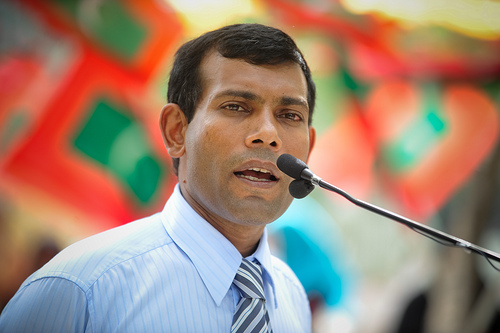
Former Maldives President Mohamed Nasheed in 2009. <a href="http://www.flickr.com/photos/presidencymaldives/3719187667/sizes/m/in/photostream/">Presidency Maldives</a>/Flickr
The president of the Maldives, Mohamed Nasheed, resigned on Tuesday amid what has been described in some press accounts as a coup. There are plenty of questions about the circumstances of his departure from power, but what is clear is that it means the loss of one of the most powerful and visible international leaders on climate change.
Nasheed told reporters on Wednesday he was forced to resign at gunpoint, after what appeared to be a mutiny by police officers and protesters. From Reuters:
“Yes, I was forced to resign at gunpoint,” Nasheed told reporters after his party meeting a day after his resignation. “There were guns all around me and they told me they wouldn’t hesitate to use them if I didn’t resign.
“I call on the chief justice to look into the matter of who was behind this coup. We will try our best to bring back the lawful government.”
Yet the newly installed president, Mohammed Waheed Hassan, said on Tuesday that it was a peaceful transition. The change of power has sparked rioting in the streets as well. It’s not clear at this point what will happen in the country, and a United Nations political mission is expected to visit later this week.
The tiny island nation in the Indian Ocean has a population of just 395,000, and in 2008 Nasheed became the country’s first democratically elected president. In that capacity, he has been a leading international voice advocating action on climate change. To illustrate the threat that sea level rise posed to his nation, he held a cabinet meeting underwater in 2009. And in 2010 his government installed solar panels on the presidential residence and rolled out a plan to cut the country’s emissions. As Maldivian Environment Minister Mohamed Aslam told Mother Jones at the time, “We are the front line, we can start dealing with it ourselves.”










